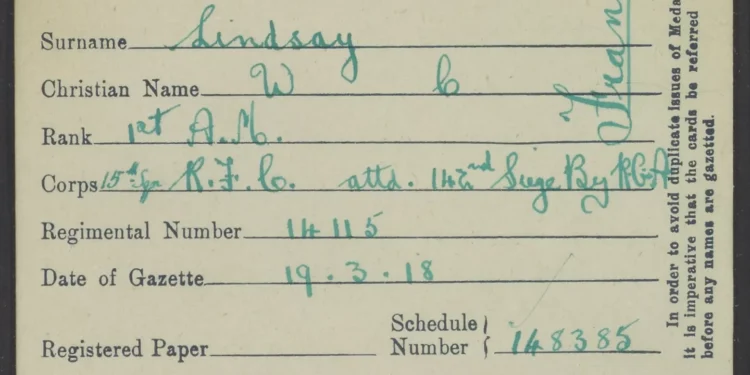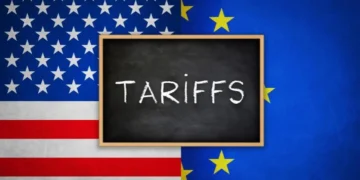The National Archives, in partnership with Forces War Records, has recently launched a new digital collection that is sure to be of great interest to those researching their family history. The collection, titled “Royal Flying Corps and Successors: World War One Gallantry Award Medal Index Cards”, contains almost 12,000 cards that provide valuable information about the brave men who served in the Royal Flying Corps during World War One.
These index cards are a mixture of handwritten and typed records, making them a unique and valuable resource for those looking to learn more about their ancestors who served in the Royal Flying Corps. They also include a rare and fascinating glimpse into the lives of these brave men, as they contain details about their gallantry awards and other important information.
The Royal Flying Corps, formed in 1912, was the first military flying service in the United Kingdom. It played a crucial role in World War One, providing aerial support and reconnaissance for ground troops. The men who served in the Royal Flying Corps were true pioneers, as aviation was still a relatively new and dangerous field at the time. They risked their lives every day to defend their country and protect their fellow soldiers on the ground.
The new digital collection from the National Archives and Forces War Records is a valuable resource for those looking to learn more about these brave men and their service in the Royal Flying Corps. The index cards contain information about the gallantry awards received by these men, including the Military Cross, Distinguished Flying Cross, and Victoria Cross. This information can provide a deeper understanding of the courage and bravery displayed by these men during the war.
The collection also includes details about the individual’s service, such as their rank, unit, and dates of service. This can be particularly helpful for those looking to trace their family history and learn more about their ancestors’ military service. The index cards also contain information about the individual’s birthplace and next of kin, providing a more personal touch to the records.
One of the most interesting aspects of this collection is the mixture of handwritten and typed records. The handwritten cards add a personal touch, as they were filled out by hand by the men themselves or their commanding officers. This makes the records feel more authentic and provides a unique insight into the thoughts and experiences of these brave men.
The launch of this digital collection is a significant milestone for the National Archives and Forces War Records. It is a testament to their commitment to preserving and sharing the history of the Royal Flying Corps and the brave men who served in it. The collection is easily accessible online, making it easier for people to research and discover more about their family’s military history.
Forces War Records, the leading military family history website from Ancestry®, has been a valuable partner in this project. Their expertise and dedication to preserving military records have been instrumental in creating this collection and making it available to the public. This partnership has also allowed for the collection to be digitized and made available online, ensuring that these important records are preserved for future generations.
In conclusion, the new digital collection of Royal Flying Corps and successors: World War One Gallantry Award Medal Index Cards is an invaluable resource for those interested in learning more about their family’s military history. It provides a unique and personal insight into the lives of the brave men who served in the Royal Flying Corps during World War One. The National Archives and Forces War Records should be commended for their efforts in preserving and sharing this important part of our history.










